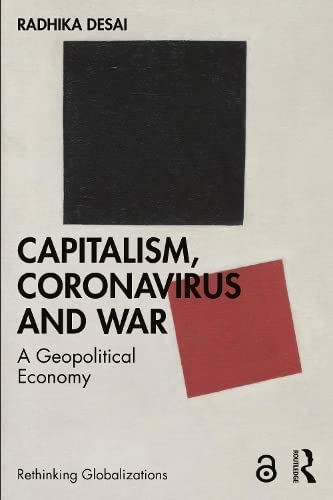The Geopolitical Economy Research Group is thrilled to announce the release of GERG director Radhika Desai’s new book: Capitalism, Coronavirus and War: A Geopolitical Economy!
The was released today, December 9th, and is available open access. The PDF can be obtained for free at the publisher’s website. Physical copies are also available for purchase on the publisher’s website, at amazon.com, at amazon.ca and at amazon.co.uk. Physical copies are also available for purchase.
The book is Desai’s analysis of the current dangerous conjuncture that threatens human and planetary annihilation. Instead of explaining it as a result of vast uncontrollable forces, she places it squarely at the door of capitalism and imperialism in an original Marxist analysis which builds on Geopolitical Economy’s clarification that nations were as material for Marx as were classes and co-equal agents of history.
To access the free PDF, got to the website and click the tab that says ‘Open access content is available for this title.’ If you encounter any problems, do let us know.
Knowledge Unlatched, a pioneering venture that seeks to make important works available open access, chose this book among their offerings this year.
Capitalism, Coronavirus and War investigates the decay of neoliberal financialised capitalism as revealed in the crisis the novel coronavirus triggered, but did not cause, a crisis that has been deepened by the conflict over Ukraine and its repercussions across the globe.
Leading domestically to economic and political breakdown, the pandemic accelerated the imperial decline of the US-led capitalist world’s power, intensifying the tendency to lash out with aggression and militarism, as seen in the US-led West’s New Cold War against China and the proxy war against Russia over Ukraine. The geopolitical economy of the decay and crisis of this form of capitalism suggests that the struggle with socialism that has long shaped the fate of capitalism has reached a tipping point. The author argues that mainstream and even many progressive forces take capitalism’s longevity for granted, misunderstand its historical dynamics and deny its formative bond with imperialism. Only a theoretically and historically accurate account of capitalism’s dynamics and historical trajectory, which this book provides, can explain its current failures and predicament. It also reveals why, though the pandemic — by revealing capitalism’s obscene inequality and shocking debility — prompted the most serious critiques of capitalism to emerge in decades, hopes of ‘building back better’ were so quickly dashed. This book sheds a searching light on the dominant narratives that have normalised the neoliberal financialised capitalism and the dollar creditocracy dominating the world economy, with even critics unable to link capitalism’s neoliberal turn to its financialisation, historical decay, productive debility and international decline. It contends that only by appreciating the seriousness of the crisis and rectifying our understanding of capitalism can progressive forces thwart a future of chaos and/or authoritarianism and begin the long task of building socialism.
This book will be of great interest to students, scholars and researchers of international relations, international political economy, comparative politics and global political sociology.
Praise for Capitalism, Coronavirus and War:
“Radhika Desai’s Capitalism, Coronavirus and War explains why the dream of a neoliberal ‘end of history’ has turned out to be a dead end. Her excellent book provides a clear perspective to frame the internal contradictions of America’s neoliberal policies that are driving Western capitalism into austerity and a chronic health crisis as its New Cold War actually is a class war.
What makes Radhika’s book so important is her clear explanation of how the world’s actual history is being created by the socialist Beijing Consensus based on public infrastructure to raise living standards and productivity. This is what the West’s former socialist and labor parties have lost, she explains. Most insightful is her analysis of how the socialist policy of making money and credit a public utility saves economies from the US–British disease of financialization and debt deflation that has left its only hope for prosperity to be what it can exploit from Eurasia, Africa and South America.”
Michael Hudson, author of The Destiny of Civilization and Super Imperialism, Distinguished Professor of Economics, University of Missouri, Kansas City (UMKC), USA
“Desai’s timely book does a magnificent job at showing how the capitalist West’s catastrophic management of the Covid-19 pandemic, along with its potentially planet-annihilating New Cold War against Russia and China — carried out through a ‘hot’ proxy war in Ukraine, and potentially in Taiwan — are not isolated and accidental events. These are all interconnected and symptomatic of a moribund capitalism, whose contradictions, and their manifestation in the 1970s crisis, drove it into an era of neoliberal financialization which merely prolonged its death sentence. With the emergence of socialist China and pluripolarity, the spectacle of capitalism’s decay is before us, but with it also is the fact that it prefers an apocalyptic end to the end of its hegemony. The question for us will be: can we take advantage of these objectively ripe conditions to organize for socialism? Or will we continue to be haunted by Fukuyama’s proclaimed end of history so much so that we lose sight of the fact that the end of history is itself coming to an end? Desai definitively shows the putrescent condition of capitalism and the genuine potential this provides for those who can imagine a socialist world beyond our current barbaric one.”
Carlos L. Garrido, Cuban American PhD student and instructor in philosophy at Southern Illinois University, Carbondale (with an MA in philosophy from the same institution). His research focuses include Marxism, Hegel, early nineteenth century American socialism, and socialism with Chinese characteristics. He is an editor in the Marxist educational project Midwestern Marx and in the Journal of American Socialist Studies. His popular writings have appeared in dozens of socialist magazines in various languages
We remind our readers that publication of articles on our site does not mean that we agree with what is written. Our policy is to publish anything which we consider of interest, so as to assist our readers in forming their opinions. Sometimes we even publish articles with which we totally disagree, since we believe it is important for our readers to be informed on as wide a spectrum of views as possible.












